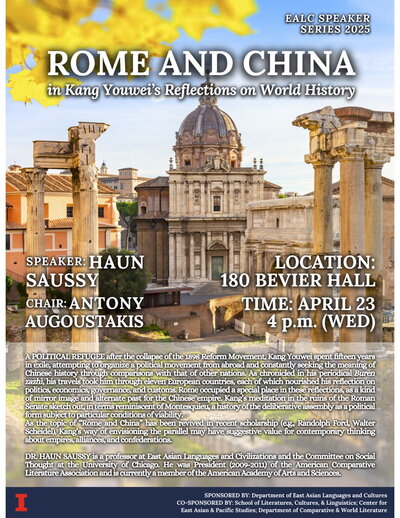
The Department sponsors an active and lively series of lectures with distinguished speakers from US and international universities.
Wednesday, April 23, 2025
Haun Saussy, “Rome and China in Kang Youwei’s Reflections on World History”

About the lecture: A political refugee after the collapse of the 1898 Reform Movement, Kang Youwei spent fifteen years in exile, attempting to organize a political movement from abroad and constantly seeking the meaning of Chinese history through comparisons with that of other nations. As chronicled in his periodical Buren zazhi, his travels took him through eleven European countries, each of which nourished his reflection on politics, economics, governance, and customs. Rome occupied a special place in these reflections, as a kind of mirror image and alternate past for the Chinese empire. Kang’s meditation in the ruins of the Roman Senate sketch out, in terms reminiscent of Montesquieu, a history of the deliberative assembly as a political form subject to particular conditions of viability. As the topic of “Rome and China” has been revived in recent scholarship (e.g., Randolph Ford, Walter Scheidel), Kang’s way of envisioning the parallel may have suggestive value for contemporary thinking about empires, alliances, and confederations.
About the speaker: Dr. Haun Saussy is a professor at East Asian Languages and Civilizations and the Committee on Social Thought at the University of Chicago. He was president (2009-2011) of the American Comparative Literature Association and is currently a member of the American Academy of Arts and Sciences. His primary research interests include classical Chinese poetry and commentary, literary theory, comparative study of oral traditions, problems of translation, pre-twentieth-century media history, and ethnography and ethics of medical care. He is the author of six monographs and the editor/co-editor of seven books. His most recent monograph is The Making of Barbarians: China in Multilingual Asia (2022).
Sponsor: Department of East Asian Languages and Cultures
Co-Sponsors: School of Literatures, Cultures & Linguistics; Center for East Asian & Pacific Studies; Department of Comparative & World Literature
Past events:
Friday, November 22, 2024
Adam L. Kern, "If the Shoe Fits! The Curious Transnational Case of Mizuki Shigeru’s ‘Japanese Cinderella’ Manga"

Talk Abstract: Mizuki Shigeru (1922-2015), one of Japan’s preeminent creators of manga, known for his interest in tricksy monsters (bakemono), posthumously published a story (2018) about Little Miss Cup Cap (Hachikazuki), a fairytale character routinely described as “the Japanese Cinderella.” This talk explores the surprising transnational nature both of the perennially favorite children’s story behind the manga as well as of the manga form itself.
Adam L. Kern started reading manga as a high-school exchange student outside Tokyo. His subsequent experiences in Japan include a brief stint as an editorial intern at Kōdansha, the largest publisher of manga, as well as research affiliations at The National Institute of Japanese Literature, the University of Kyoto, and the University of Tokyo. Having earned his Ph.D. at Harvard, where he served on the faculty for close to a decade, Kern is currently Professor of Japanese Literature and Visual Culture at the University of Wisconsin-Madison. His manga course there was profiled in a feature-length documentary film that aired on primetime TV in Japan. Kern’s book on the history of manga, titled Manga from the Floating World (Harvard University Asia Center, 2006), was reissued in 2019 in a second edition with a new preface.
Time: November 22 (Friday), at 2 pm
Location: Lucy Ellis Lounge, 1080 LCLB
Sponsor: Department of East Asian Languages and Cultures
Co-Sponsors: Center for East Asian & Pacific Studies; Department of Comparative & World Literature
Thursday, November 14, 2024
Quillon Arkenstone, "The Anti-espionage Novel and the Fostering of Wartime Subjectivity in Imperial Japan and Korea"
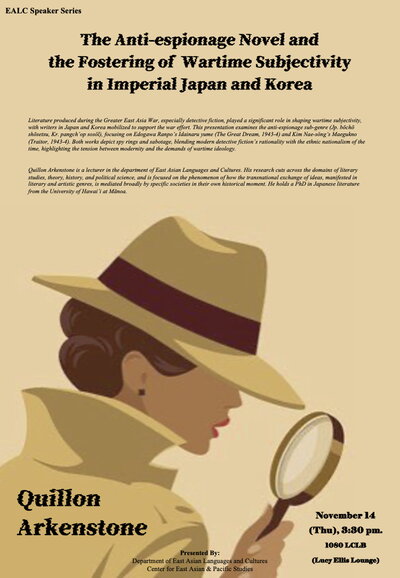
About the Talk: Forgotten in Japan and maligned as collaboration in Korea, literature produced during the Greater East Asia War is nevertheless recognized as having played an important role in the creation and maintenance of a wartime subjectivity. Writers from both societies were mobilized in support of the war, and this included those active in detective fiction, arguably the war’s most popular genre. While recent scholarship has begun to offer a composite view of the genre and its preeminent figures in the modern period, works produced during the years 1941-45 continue to be given short shrift, a gap this presentation addresses by examining a sub-genre of detective fiction that was particularly active during the war, the anti-espionage, or spy, novel (Jp. bōchō shōsetsu, Kr. pangch’op sosŏl). Focusing on Edogawa Ranpo’s Idainaru yume (The great dream, 1943-4), and Kim Nae-sŏng’s Maegukno (Traitor, 1943-4) two works that immerse readers in the subjective experience of the war through depictions of spy rings, technological secrets and sabotage, I highlight the genre’s attempts to reconcile the enlightenment thinking of modern detective fiction with the sanguinary ethnic nationalism permeating the conflict. The result, cast into relief by the genre’s differing trajectories in metropole and colony, is a contradiction between a dependence on a rational modernity and the pressure to accommodate wartime ideology, in whose name that modernity was being reoriented to serve a very irrational war.
About the Speaker:Quillon Arkenstone is a lecturer in the department of East Asian Languages and Cultures. His research cuts across the domains of literary studies, theory, history, and political science, and is focused on the phenomenon of how the transnational exchange of ideas, manifested in literary and artistic genres, is mediated broadly by specific societies in their own historical moment. He holds a PhD in Japanese literature from the University of Hawai’i at Mānoa.
Time: November 14 (Thu), at 3:30
Location: Lucy Ellis Lounge, 1080 LCLB
Hosted by the Department of East Asian Languages and Cultures
Co-Sponsored by Center for East Asian & Pacific Studies
Thursday, April 24, 2024:
Peter Kornicki, “The Edo Period as a Manuscript Culture"
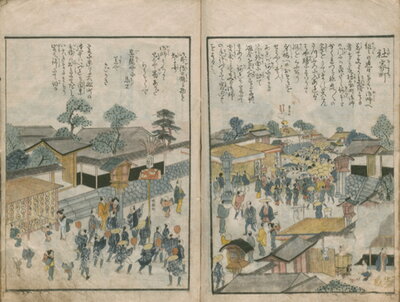
Printing began in Japan in the 8th century with the production of the Hyakumantō darani, though they were produced for ritual purposes not for reading. Texts were printed for reading from the 11th century onwards and from the beginning of the 17th century commercial publication took off rapidly and so successfully that by the 1660s catalogues of books in print were printed. So surely it is perverse to describe the Edo period as a manuscript culture? Well, no. Because the focus on Japan as a print society like that of contemporary Europe has blinded us to the dominance of manuscript culture and to the categories of knowledge that could only be accessed via manuscripts. Manuscript culture in Japan and the activities that sustained it have been little studied in Japan, let alone Korea or China, but in this talk I will show what we miss by ignoring manuscripts.
Location
Levis Faculty Center, Room 210 (919 W Illinois St., Urbana)
Date
Apr 25, 2024 4:00 - 5:30 pm
About the Speaker
Peter Kornicki is best known for his work on the cultural history of Japan, particularly the history of books and maps. He has studied how ideas and literature were circulated in Japan, how these books were read, and what factors determined their reception by different audiences. Kornicki is emeritus professor of Japanese at Robinson College in the University of Cambridge and currently president of the British Association for Japanese Studies.
While he is no longer teaching, his research and publications have continued unabated, and he is the editor in chief of the journal East Asian Publishing and Society. Since 2005, he has broadened his scholarship to include Korea, Vietnam, and China. In 2018, Kornicki completed a major study on the influence of Chinese textual culture on East Asia entitled Languages, Scripts and Chinese Texts in East Asia (2018). His other major works include The Book in Japan: A Cultural History from the Beginnings to the Nineteenth Century (1998), Early Japanese Books in Cambridge University Library: A Catalogue of the Aston, Satow, and von Siebold Collections (1991) with co-editor N. Hayashi, and The Cambridge Encyclopedia of Japan (1993) with co-editor Richard Bowring.
Among many honors, Kornicki received the Japan Foundation Special Prize in 1992, the Yamagata Bantō Prize in 2013, and the Order of the Rising Sun with Golden Rays and Neck Ribbon from the Emperor of Japan in 2017. He is a fellow of the British Academy and received the degree of Doctor of Letters from the University of Oxford in 2011.
His recent work includes Eavesdropping on the Emperor: Interrogators and Codebreakers in Britain’s War with Japan (2021) and, with Japanese co-editors, The Bramsen Collection at the National Museum of Denmark (2023), a study of Japanese coins and books collected in Japan in the 1870s. He has recently complete a book in Japanese on manuscript culture in the Edo period.
* Image Courtesy of Bavarian State Library.
The event is co-sponsored by CEAPS
Thursday, October 13, 2022:
LeRon Harrison, “Gagaku: A Brief Introduction and Thematic Cultural History”
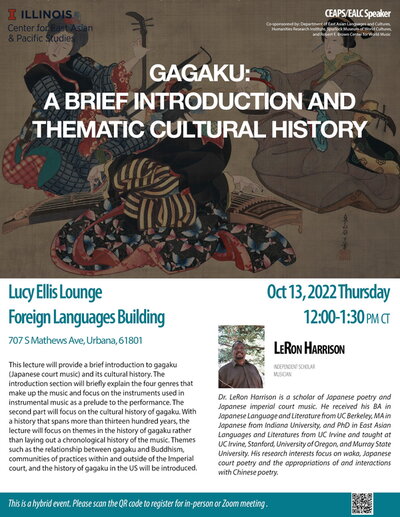
This lecture will provide a brief introduction to gagaku (Japanese court music) and its cultural history. The introduction section will briefly explain the four genres that make up the music and focus on the instruments used in instrumental music as a prelude to the performance. The second part will focus on the cultural history of gagaku. With a history that spans more than thirteen hundred years, the lecture will focus on themes in the history of gagaku rather than laying out a chronological history of the music. Themes such as the relationship between gagaku and Buddhism, communities of practices within and outside of the Imperial court, and the history of gagaku in the US will be introduced.
About the speaker: Dr. LeRon Harrison is a scholar of Japanese poetry and Japanese imperial court music. He received his BA in Japanese Language and Literature from UC Berkeley, MA in Japanese from Indiana University, and PhD in East Asian Languages and Literatures from UC Irvine and taught at UC Irvine, Stanford, University of Oregon, and Murray State University. His research interests focus on waka, Japanese court poetry and the appropriations of and interactions with Chinese poetry.
To register: Hybrid Event - Registration (in-person and virtual)
The event is co-sponsored by CEAPS.
***
FRIDAY, April 22, 2022
Gergana Ivanova (University of Cincinnati), "The Many Lives of a Japanese Classic: Sei Shōnagon’s Pillow Book"
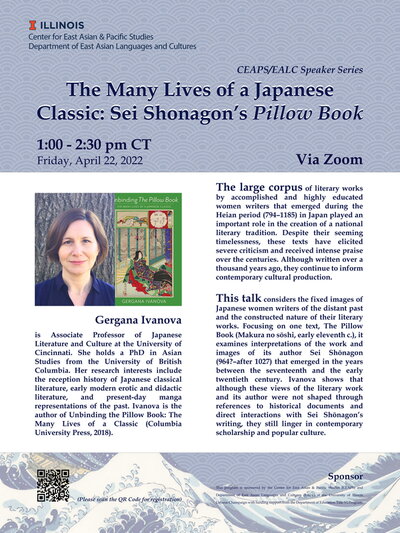
The large corpus of literary works by accomplished and highly educated women writers that emerged during the Heian period (794–1185) in Japan played an important role in the creation of a national literary tradition. Despite their seeming timelessness, these texts have elicited severe criticism and received intense praise over the centuries. Although written over a thousand years ago, they continue to inform contemporary cultural production.
This talk considers the fixed images of Japanese women writers of the distant past and the constructed nature of their literary works. Focusing on one text, The Pillow Book (Makura no sōshi, early eleventh c.), it examines interpretations of the work and images of its author Sei Shōnagon (964?–after 1027) that emerged in the years between the seventeenth and the early twentieth century. Ivanova shows that although these views of the literary work and its author were not shaped through references to historical documents and direct interactions with Sei Shōnagon’s writing, they still linger in contemporary scholarship and popular culture.
Time and Location: Apr 22, 2022 1:00 - 2:30 pm . This is a virtual event. To register and receive the link, click here.
About the speaker: Gergana Ivanova is Associate Professor of Japanese Literature and Culture at the University of Cincinnati. She holds a PhD in Asian Studies from the University of British Columbia. Her research interests include the reception history of Japanese classical literature, early modern erotic and didactic literature, and present-day manga representations of the past. Ivanova is the author of Unbinding the Pillow Book: The Many Lives of a Classic (Columbia University Press, 2018).
The event is co-sponsored by the Center for East Asian and Pacific Studies (CEAPS).
***
FRIDAY April 10, 2020 ***This event was cancelled due to Covid19***
Edith Sarra (Indiana University, Bloomington), "Poetry, Polygyny and Narrative Closure at the End of Genji’s Tale"
Two thirds of the way through the Tale of Genji, the eponymous hero dies, a death that the narrator refrains from telling. Instead, the chapter that follows Genji’s final appearance opens with a shocking announcement: “Now that his light was gone, among the many descendants who had basked in his glow there, not one could take his place.” In the millenium since Genji’s unnarrated death, many famous frustrated scholars and fans have attempted to supply a clearer sense of an ending to Genji’s life story. Writing in the early 1930s, the French novelist Marguerite Yourcenar imagined Genji dying in a state of senile dementia, attended by a former mistress he has entirely forgotten. Unlike Yourcenar, I will argue that closure in the story of Genji’s life has everything to do with the opposite problem: the hero’s painfully strong memory. Genji is tormented at the end of his life not because he cannot remember the women he addresses, but by an excess of memory that the narrative itself mirrors, “remembering” its own previously deployed tropes as it circles back over them in ever diminishing arcs. I will outline, from a gendered perspective, the kind of closure the tale fosters by leaving Genji poised between mourning the death of his favorite interlocutor, Murasaki, and withdrawal from the domestic idyll he thought he created at the Rokujō mansion.
Time and Location: 12:00 pm - 1:30 pm, Lucy Ellis Lounge, Foreign Languages Bldg., 707 S. Mathews Ave., Urbana
About the speaker: Edith Sarra is Associate Professor of East Asian Languages and Cultures and Adjunct Associate Professor of Comparative Literature at Indiana University, Bloomington. She is the author of Fictions of Femininity: Literary Inventions of Gender in Japanese Court Women's Memoirs (Stanford University Press, 1999) and Unreal Houses Character, Gender, and Genealogy in the Tale of Genji (Harvard University Press, 2020).
***This event was cancelled due to Covid19***
FRIDAY April 17, 2020
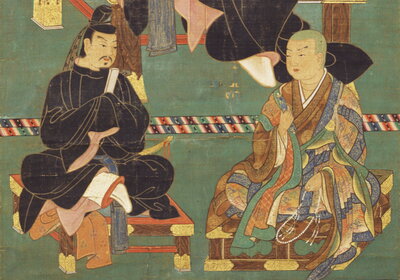
Mikael Bauer (McGill University), "Ascending the Mountain: The Eclectic Universe of the Chronicle of Muchimaro"
This lecture examines the eclectic narrative of the eighth century Chronicle of Muchimaro (Muchimaro den 武智麻呂伝), the third and final part of the History of the Fujiwara House (Tōshi kaden 藤氏家伝). Partly attributed to the much maligned courtier Fujiwara no Nakamaro (藤原仲麻呂; 706–764), one of the main political figures of the Nara period, this clan history provides more than a mere biography; the text aims at legitimizing the position of the Fujiwara at court, and by doing so attributes unique, supernatural characteristics to Fujiwara no Muchimaro (藤原 武智麻呂, 680 –737). Central to the formulation of this legitimacy is the incorporation of Buddhist narratives, references to indigenous spirits and even imagery that evokes the ideal of the wandering Daoist sage.
Time and Location: 12:00 pm - 1:30 pm, Lucy Ellis Lounge, Foreign Languages Bldg., 707 S. Mathews Ave., Urbana
About the speaker: Mikael Bauer is Assistant Professor of Japanese Religions (Buddhism) at McGill University.
FRIDAY NOVEMBER 1, 2019
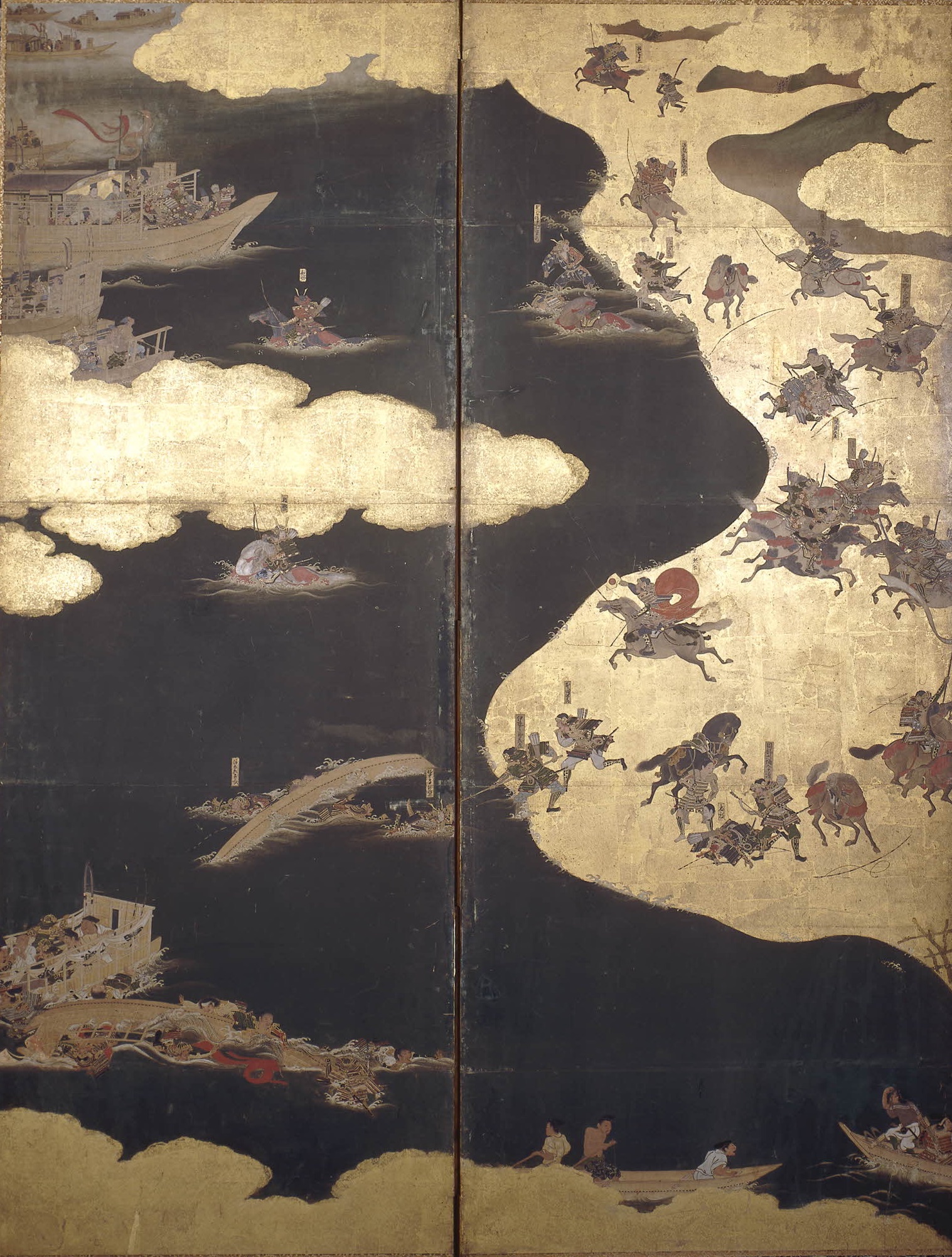 Naoko Gunji, “The Shogun’s New Iconography: Transformation of the Heike Paintings in the Tokugawa Period”
Naoko Gunji, “The Shogun’s New Iconography: Transformation of the Heike Paintings in the Tokugawa Period”
With the advent of early modern Japan, when the country was finally reunified after a century of war and strife, a great many paintings were produced to depict wars and battles. These paintings were often commissioned by the new rulers of early modern Japan, the Tokugawa shoguns and their relatives. Some of these battle paintings were about recent battles that the patrons and their fathers had won meritoriously. A large number of them, however, depicted battles from the distant past, and in particular the Genpei War (1180-1185), a war that was fought five centuries earlier. Using artwork from various important collections, Dr. Gunji’s talk will address the question of why the rulers of the Tokugawa period commissioned many pictures of the distant Genpei past.
Time and Location: 12:00 pm - 1:30 pm, Lucy Ellis Lounge, Foreign Languages Bldg., 707 S. Mathews Ave., Urbana
***
WEDNESDAY, OCTOBER 23, 2019
Ulrich Timme Kragh (Adam Mickiewicz University, Poznan, Poland), "An Asian Theory of Narrative in Historical Discourse"
The study of historiography as a literary form making distinct uses of emplotment and tropes has been a favored topic in the theory of history ever since Hayden White published his Metahistory: The Historical Imagination in Nineteenth-Century Europe (1973). Would it be equally possible to conceive of an Asian literary theory of narrative applicable to Asian history writing? Professor Kragh will here introduce the outcomes of a five-year research project devoted to this question, giving examples of how literary notions of plot, trope, and historicity drawn from classical Indian, Chinese, and Tibetan sources can be turned into a modern methodology for a narrativist study of Asian historical discourse.
Time and location: 4:00 PM - 5:20 PM 1064 Lincoln Hall, 702 S Wright St, Urbana, IL 61801.
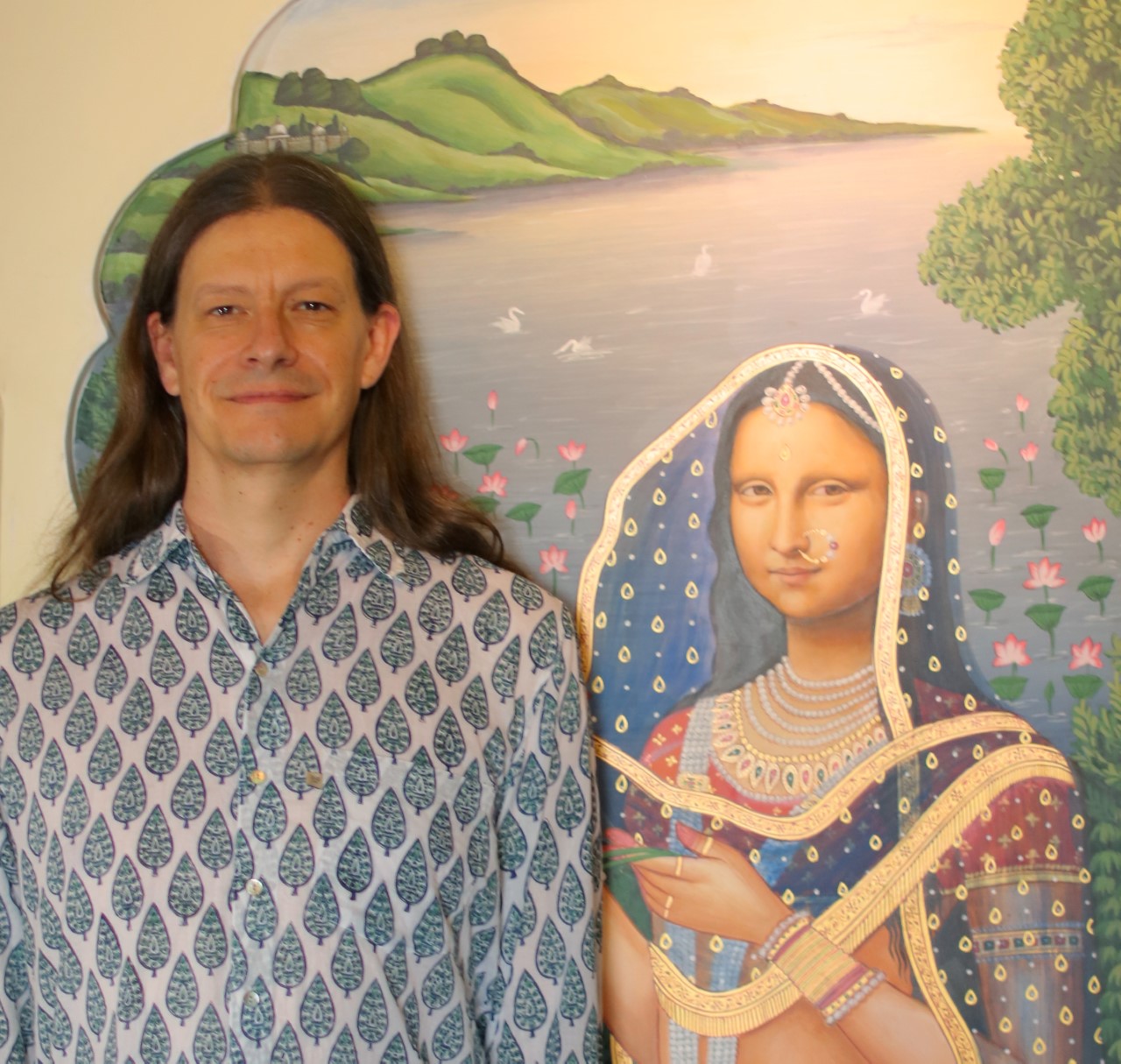 Professor Dr. Hab. Ulrich Timme Kragh (Adam Mickiewicz University, Poznan, Poland) is Principal Investigator of the project "Narrative Modes of Historical Discourse in Asia" (NAMO) funded by the European Research Council (ERC) and Director of the "Hayden White Research Center for Narrative Modes"
Professor Dr. Hab. Ulrich Timme Kragh (Adam Mickiewicz University, Poznan, Poland) is Principal Investigator of the project "Narrative Modes of Historical Discourse in Asia" (NAMO) funded by the European Research Council (ERC) and Director of the "Hayden White Research Center for Narrative Modes"
Wednesday, March 27, 2019
Koen De Ceuster (Leiden University), "In Their Own Words: North Korean Painters on Practicing Art in the DPRK"
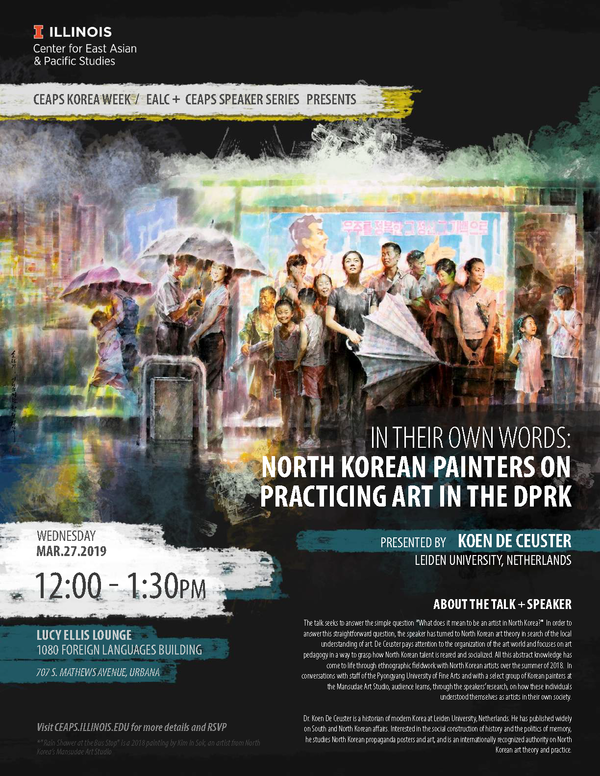 In this talk, I seek to answer the simple question “What does it mean to be an artist in North Korea?” In order to answer this straightforward question, I turn to North Korean art theory in search of the local understanding of art. I pay attention to the organization of the art world and I focus on art pedagogy in a way to grasp how North Korean talent is reared and socialized. All this abstract knowledge has come to life through ethnographic fieldwork with North Korean artists over the summer of 2018. In conversations with staff of the Pyongyang University of Fine Arts and with a select group of Korean painters at the Mansudae Art Studio, I learned how these individuals understood themselves as artists in their own society.
In this talk, I seek to answer the simple question “What does it mean to be an artist in North Korea?” In order to answer this straightforward question, I turn to North Korean art theory in search of the local understanding of art. I pay attention to the organization of the art world and I focus on art pedagogy in a way to grasp how North Korean talent is reared and socialized. All this abstract knowledge has come to life through ethnographic fieldwork with North Korean artists over the summer of 2018. In conversations with staff of the Pyongyang University of Fine Arts and with a select group of Korean painters at the Mansudae Art Studio, I learned how these individuals understood themselves as artists in their own society.
Time and Location: 12:00-1:30 PM, Lucy Ellis Lounge, 1080 Foreign Languages Building, 707 S. Mathews Avenue, Urbana, IL 61801
Click here to register.
Dr. Koen De Ceuster is a historian of modern Korea at Leiden University, Netherlands. He has published widely on South and North Korean affairs. Interested in the social construction of history and the politics of memory, he studies North Korean propaganda posters and art. He is an internationally recognized authority on north Korean art theory and practice.
Thursday, February 28, 2019
Michel Hockx (University of Notre Dame), "Censorship, Morality, and Cultural Policy under Xi Jinping"
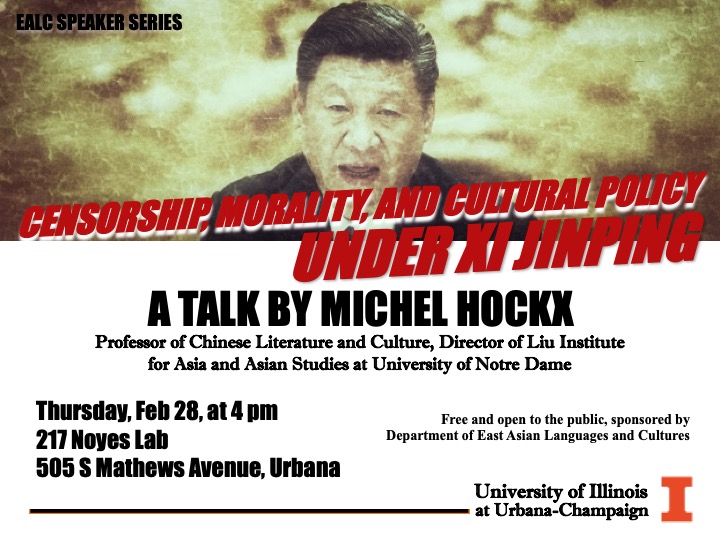 In October 2014, Chinese leader Xi Jinping held a widely publicized meeting with representatives of literary and artistic circles. A year later the full text of his speech at the meeting was published and became the foundation of PRC cultural policy. Western observers were quick to point out analogies between Xi’s meeting and the Yan’an forum of 1942, when Mao Zedong laid down the rules of art for the socialist period. Others opined that Xi’s speech had heralded a return to the policies of the Cultural Revolution. Yet a closer analysis of Xi’s text shows that he used his speech to reiterate and solidify a moralistic view of literature and art that has been the consensus in government circles since the start of the reform period in 1978. According to this consensus, cultural work is significant because it spreads the positive values of “truth, goodness, and beauty” – a triad well-known from the history of European philosophy and often used to build moralistic value systems. Xi Jinping and his speech writers awkwardly combine this traditional European view of the nature of art with a call for greater adherence to native Chinese traditions, and for patriotism.
In October 2014, Chinese leader Xi Jinping held a widely publicized meeting with representatives of literary and artistic circles. A year later the full text of his speech at the meeting was published and became the foundation of PRC cultural policy. Western observers were quick to point out analogies between Xi’s meeting and the Yan’an forum of 1942, when Mao Zedong laid down the rules of art for the socialist period. Others opined that Xi’s speech had heralded a return to the policies of the Cultural Revolution. Yet a closer analysis of Xi’s text shows that he used his speech to reiterate and solidify a moralistic view of literature and art that has been the consensus in government circles since the start of the reform period in 1978. According to this consensus, cultural work is significant because it spreads the positive values of “truth, goodness, and beauty” – a triad well-known from the history of European philosophy and often used to build moralistic value systems. Xi Jinping and his speech writers awkwardly combine this traditional European view of the nature of art with a call for greater adherence to native Chinese traditions, and for patriotism.
This talk will trace the history of the triad “truth, goodness, and beauty” in modern Chinese cultural discourse and look in detail at its application in the formulation of cultural policy since 2014. It also looks at the effect of the discourse on cultural production and the shifting levels of tolerance for deviation from prescribed moral standards.
Time and Location: Thursday, February 28, 2019 4:00-5:30 PM, 217 Noyes Lab, 505 S Mathews Ave, Urbana, IL 61801
 Michel Hockx is Professor of Chinese Literature in the Department of East Asian Languages and Cultures and Director of the Liu Institute for Asia and Asian Studies in the Keough School of Global Affairs at the University of Notre Dame. His monograph Internet Literature in China (Columbia UP, 2015) was listed by Choice magazine as one of the “Top 25 Outstanding Academic Titles of 2015.”
Michel Hockx is Professor of Chinese Literature in the Department of East Asian Languages and Cultures and Director of the Liu Institute for Asia and Asian Studies in the Keough School of Global Affairs at the University of Notre Dame. His monograph Internet Literature in China (Columbia UP, 2015) was listed by Choice magazine as one of the “Top 25 Outstanding Academic Titles of 2015.”
Thursday, November 29, 2018
Mark Frank, "Hunger in the Making of a Modern Sino-Tibetan Borderland" 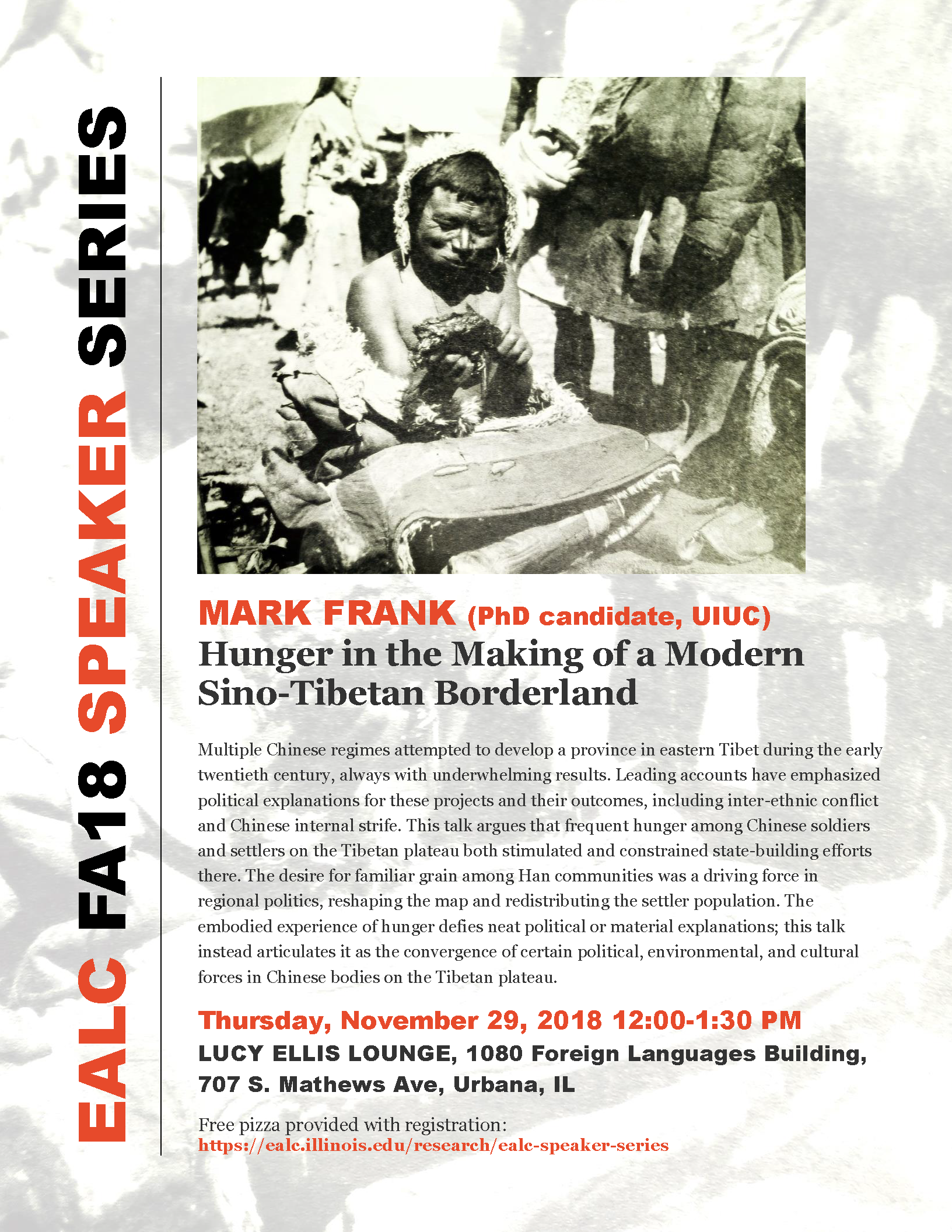
Multiple Chinese regimes attempted to develop a province in eastern Tibet during the early twentieth century, always with underwhelming results. Leading accounts have emphasized political explanations for these projects and their outcomes, including inter-ethnic conflict and Chinese internal strife. This talk argues that frequent hunger among Chinese soldiers and settlers on the Tibetan plateau both stimulated and constrained state-building efforts there. The desire for familiar grain among Han communities was a driving force in regional politics, reshaping the map and redistributing the settler population. The embodied experience of hunger defies neat political or material explanations; this talk instead articulates it as the convergence of certain political, environmental, and cultural forces in Chinese bodies on the Tibetan plateau.
Time and Location: Thursday, November 29, 2018 12:00-1:30 PM, LUCY ELLIS LOUNGE, 1080 Foreign Languages Building, 707 S. Mathews Ave, Urbana, IL
Mark Frank is a PhD candidate in modern Chinese history at the University of Illinois.
Free pizza provided with registration
Friday, October 12, 2018
Christopher Callahan (University of Illinois, Urbana-Champaign)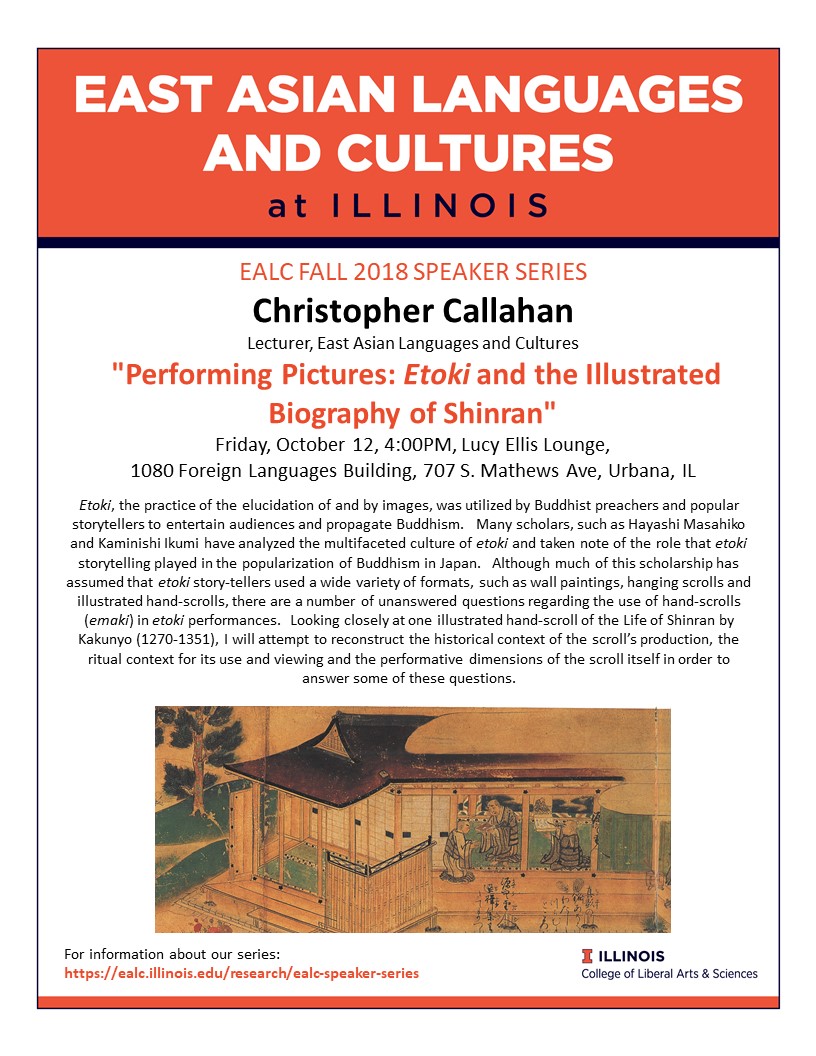
"Performing Pictures: Etoki and the Illustrated Biography of Shinran"
Etoki, the practice of the elucidation of and by images, was utilized by Buddhist preachers and popular storytellers to entertain audiences and propagate Buddhism. Many scholars, such as Hayashi Masahiko and Kaminishi Ikumi have analyzed the multifaceted culture of etoki and taken note of the role that etoki storytelling played in the popularization of Buddhism in Japan. Although much of this scholarship has assumed that etoki story-tellers used a wide variety of formats, such as wall paintings, hanging scrolls and illustrated hand-scrolls, there are a number of unanswered questions regarding the use of hand-scrolls (emaki) in etoki performances. Looking closely at one illustrated hand-scroll of the Life of Shinran by Kakunyo (1270-1351), I will attempt to reconstruct the historical context of the scroll’s production, the ritual context for its use and viewing and the performative dimensions of the scroll itself in order to answer some of these questions.
Time and location: 4:00-5:30 PM, Lucy Ellis Lounge - 1080 Foreign Languages Building (707 S Mathews Ave, Urbana), IL
Christopher Callahan lectures on Japanese and East Asian Religions in the Department of East Asian Languages and Cultures.
Spring 2018 Events
Tuesday, April 20, 2018
Hiromi Mizuno (University of Minnesota), "The Age of Nitrogen: Agricultural Modernization and Japan"
How Japan industrialized itself and joined the ranks of the world’s colonial powers by the beginning of the 20th century is a well told story, but how it fed the fast growing population and its industrial sector is little told or studied. Nitrogen, the important soil nutrient, supported the world's expansion of economy and population, sometimes driving the powerful West's colonialism. From dried fish in Hokkaido to soybean cakes in Manchuria to chemical fertilizer in colonial Korea, Japan's search for nitrogen too played a crucial role in Japan's modernization and colonial expansion. This talk is an environmental history of soil and agriculture and provides a fresh new perspective to Japan's modernization in the 20th century.
Time and location: 12-1:30 pm, Lucy Ellis Lounge - 1080 Foreign Languages Building (707 S Mathews Ave, Urbana)
Hiromi Mizuno is Associate Professor of History at University of Minnesota, Twin Cities.
Saturday, May 5, 2018
The 5th Annual SEAS Graduate Student Symposium: Narratives of (Il)legibility in East Asia
(Keynote Speaker: Johanna Ransmeier, University of Chicago)
Time and Location: ALL DAY, 1080 Foreign Languages Building - Lucy Ellis Lounge (707 S Mathews Ave., Urbana)
Fall 2017 events:
October 16, 2017 Yongming Xu (Zhejiang University), "Digital Resources, Digital Humanites Maps and Humanities Research"
November 10, 2017 Tomohiko Sumiyoshi (Keio University), "Sino-Japanese Book Cultures of Medieval Japan: Scholarship, Libraries, Publishing"
Download the calendar
Monday, October 16, 2017
Yongming Xu (Zhejiang University), "Digital Resources, Digital Humanites Maps and Humanities Research"
This lecture will introduce the audience to a rich repertoire of digital resources, digital tools, digital humanities maps for scholars working in East Asian humanities. The speaker will demonstrate how to conduct indepth research using these sources and inform the audience of various completed and on-going projects utilizing these digital humanities resources.
Time and location: 4:00 p.m. Room 1022 Lincoln Hall, 702 S. Wright Street See event flyer
Yongming Xu is Professor of Chinese Literature at Zhejiang University and Assistant Director of Zhejiang Classical Texts Research Center. He obtained his obtained his Ph. D. from Zhejiang University in 2002. He has been a visiting scholar at Harvard-Yenching Institute and the Department of East Asian Languages and Civilizations, Harvard University. He has authored five monographs, edited six books, and compile and annotated several ancient texts. His publications include A Study of Wuzhou Literati from the Yuan to Early Ming; A Biography of Song Lian (1310-1381), Studies on Tao Zongyi; An Anthology of Critical Studies on Tang Xianzu in Western Scholarship (co-editor), Fang Guozhen historical materials; Tao Zongyi’s Collected Works; Zheng Yuanyou’s Collected Works; Wu Sidao’s Collected Works; and Hu Kui’s Collected Works.
Friday, November 10, 2017
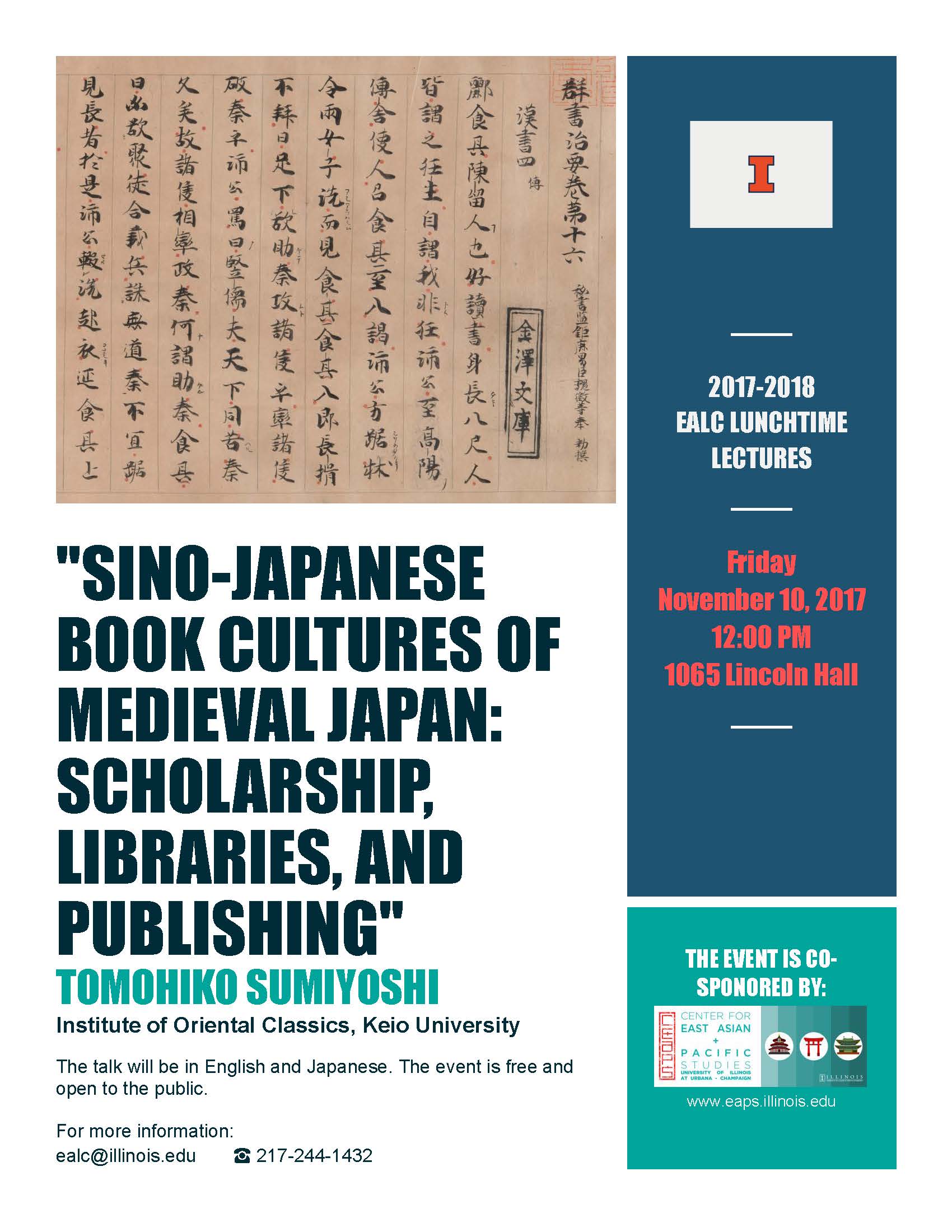 Tomohiko Sumiyoshi (Keio University), "Sino-Japanese Book Cultures of Medieval Japan: Scholarship, Libraries, Publishing"
Tomohiko Sumiyoshi (Keio University), "Sino-Japanese Book Cultures of Medieval Japan: Scholarship, Libraries, Publishing"
The talk will explore strategies to disseminate, study, and preserve Chinese-language books in Japan between 1400 and 1600.
Time and location: 12:00 p.m. Room 1065 Lincoln Hall, 702 S. Wright Street See event flyer
Tomohiko Sumiyoshi is a Professor at the Institute of Oriental Classics (Shido Bunko), Keio University, Japan. He has published widely on the reception of books in Chinese in medieval Japan.
Friday, December 8, 2017
Jing Chen (University of Illinois at Urbana Champaign), "Reinventing the Pre-Tang Tradition: Compiling and Publishing Pre-Tang Poetry Anthologies in Sixteenth-Century China"
The talk examines how the making of pre-Tang poetry anthologies in sixteenth-century Ming China led to a reinvention of the early Chinese poetic tradition. Through the study of book titles, tables of contents, prefaces, and postscripts in twenty-two pre-Tang poetry anthologies compiled in the 1500s, I identify three types of anthologizing practices. By employing quantitative and network analysis, I historicize these practices, investigate the motivations for the anthologies, and explore their citation networks. These anthologizing practices gradually transformed the classification principles of previous anthologies, expanded the scope of canonized anthologies, and established a distinct pre-Tang tradition by the end of the sixteenth century.
Time and Location: 12:00 p.m. Lucy Ellis Lounge, Foreign Language Building, 707 S. Mathews Ave. See event flyer.
Jing Chen is currently a PhD Candidate and an Instructor in the Department of East Asian Languages and Cultures at the University of Illinois, Urbana-Champaign. Her research interests include pre-1900 Chinese literature, classical Chinese poetry and poetics, as well as literary criticism in late imperial China. She is currently working on a project that studies the publication and reception of poetry anthologies in China from the 16th century to the 18th century.
February 23, 2017
Prasenjit Duara,"Sustainability and the Crisis of Transcendence: The Long View from Asia"
The crisis of global modernity has been produced by human overreach that was founded upon a paradigm of national modernization. Today, three global changes: the rise of non-western powers, the crisis of environmental sustainability and the loss of authoritative sources of transcendence – the ideals, principles and ethics once found in religions -- define our condition. The physical salvation of the world is becoming the transcendent goal of our times, transcending national sovereignty. The foundations of sovereignty can no longer be sought in tunnelled histories of nations; we are recognizing that histories have always been circulatory and the planet is a collective responsibility.
Time and Location: Feb 23, 2017 3:30 - 5:00 pm, Room 319 Gregory Hall
Prasenjit Duara is the Oscar Tang Chair of East Asian Studies at Duke University. Born and educated in India, he received his PhD in Chinese history from Harvard University. He was Professor of History and East Asian Studies at University of Chicago (1991-2008) and Raffles Professor and Director of Asia Research Institute at the National University of Singapore (2008-2015). His latest book is The Crisis of Global Modernity: Asian Traditions and a Sustainable Future (Cambridge 2014).
This event is co-sponsored by CEAPS.